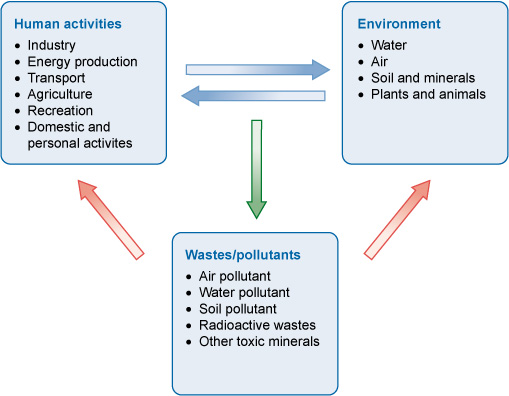The relationship of human with the environment has changed over time. Earlier impacts of human activities were limited to local or at maximum regional level. However with time, numbers of human and human induced activities have brought environmental damage at global scale.
It was not that people recognised the importance of environment late. It was always understood that the Earth behaves as a system and oceans, atmosphere, land along with living and non-living things are all connected. However there was little understanding on how the different systems were connected and how feedback mechanisms and forcing were governing the planet.
There were many experts in the past who warned humanity regarding unsustainable economic growth. Svante Arrhenius, a scientific genius and Noble laureate in Chemistry, calculated accurately by hand the effect of doubling the atmospheric CO2 concentration. He calculated by hand in 1896 that doubling the atmospheric CO2 concentration would cause a rise in the mean temperature of the planet of around 5 degrees Celsius. Today's computer models validate his results. However Arrhenius was not accurate about the timescale in which CO2 concentration will double. Arrhenius predicted that based on human consumption of coal, oil and other fossil fuels, it will take 750 years for atmospheric concentration to double. But with at the current pace, this is going to happen in only 150 years since Arrhenius predicted, i.e. in around 2050.
Pre industrial era economies were based mainly on wood, which can be renewed annually through photosynthesis. These economies called organic economies can virtually run forever. The industrial revolution started around 1750s with extensive use of coal. Coal coupled with steam engine gave rise to growth of industries and cities. Eminent classical economists Adam Smith, David Ricardo and Thomas Malthus were adamant that growth should be limited and that end state following a period of growth might well be as miserable as the situation prevailing at its beginning.
In 1798 Thomas Malthus wrote "An Essay on the Principle of Population", warning that growing human population would ultimately put pressure on land productivity leading deceleration of development and eventually cessation. He told economic growth at max can be arithmetic while population grows in geometric progression. However Malthus was not aware of tremendous progresses to be done in field of seeds and fertilisers enhancing food production. But in long run, we do understand how correct Malthus was.
Although classical economists warned about excessive economic growth in terms of its effect on humans they did mention that eventually it is the environmental factors such as land and water which will get overexploited to a level of depletion. Today more than half of the earth's land surface has been domesticated for human use. Most fisheries are fully or over-exploited. Composition of greenhouse gases, reactive gases and aerosol concentration has changed drastically in the last century. During 90s several reports emerged which talk about mass extinction of plants, animals and other species due to human induced activities. This phenomenon is known as the sixth extinction or the anthropocene extinction.
Even today when we are aware that rapid economic development degrading environmental at a pace that it may lead to human extinction at last, why we are not doing enough to counter it?
There is an interesting theory I came across why great civilizations and societies like the Maya, the Eastern Islanders, Angor Wat, and Great Zimbabwe etc. collapse after reaching a peak of development. Jared Diamond explains there are several reasons why a society may collapse. These include environmental degradation for economic growth, climate change, relationship between neighbouring countries and other political, cultural, social factors. However one the major cause is environmental damage to the extent that it eventually leads to the collapse of the society. But how societies were not able to see the negative impacts on the environment, of if they saw and understood why they were no able to solve them? This happened because of the conflict between short-term interests of the elite and long-term interests of the society. If the elite were insulated from the consequences of their actions, short-term interests will proceed over long-term.
Karl Marx has rightly pointed out long ago that during capitalism economic growth was indeed taking place, but the benefit of it was going only to a tiny majority. So if you are wondering how come people didn't realize the importance of environment and did nothing concrete to stop it, future generations will be wondering the same about us. Well at least now we know the reason.
References:
1. The Age of Sustainable Development

No comments:
Post a Comment
Je tiens ce blog depuis fin 2005. Tout lecteur peut commenter sous email valide et sous anonymat. Tout peut être écrit mais dans le respect de la liberté de penser de chacun et la courtoisie. Je modère les commentaires.